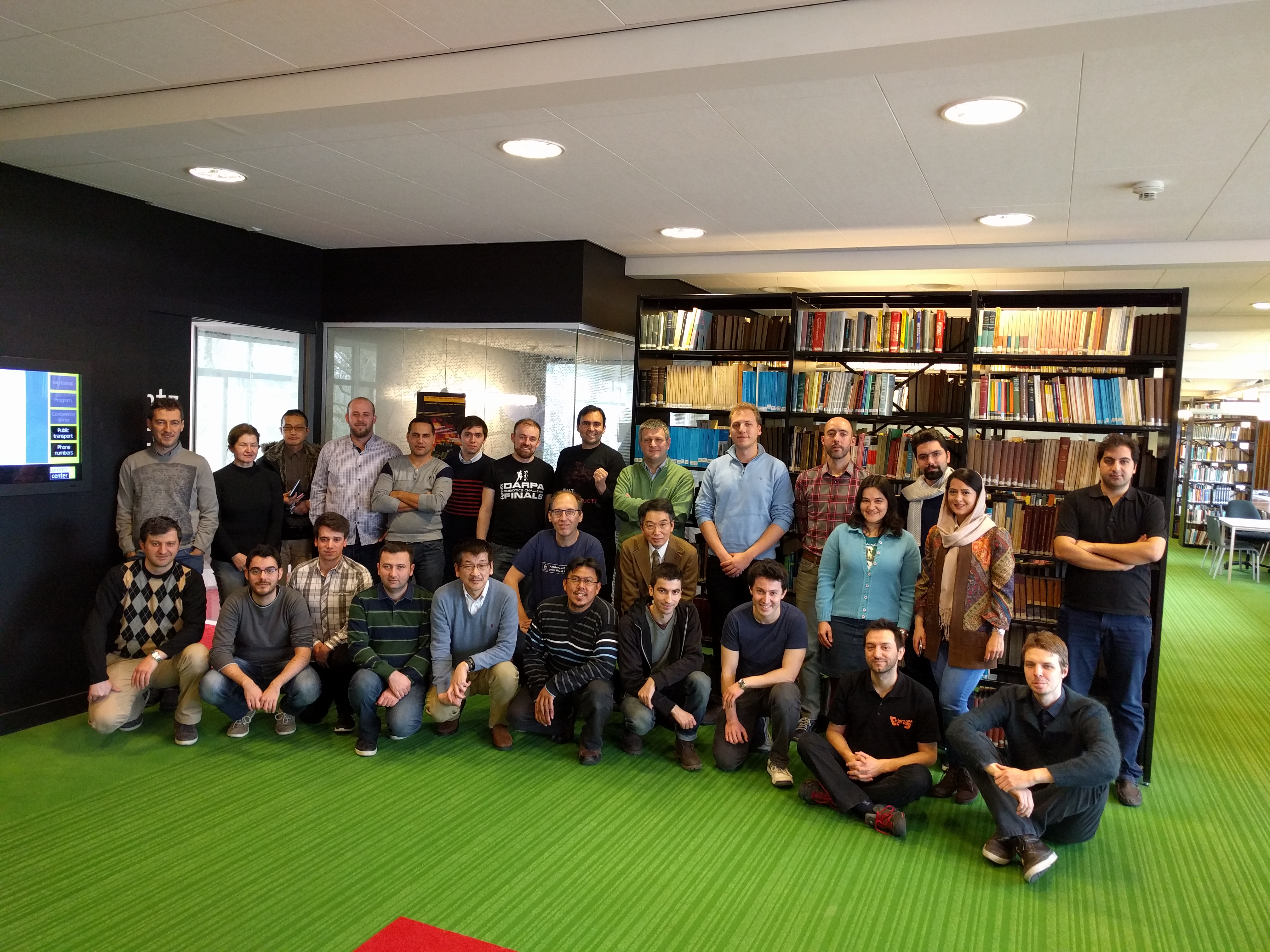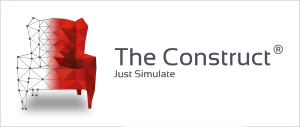The Future of Robot Rescue Simulation
Scientific challenge
The DARPA Robotics Challenge (DRC) is now finished. In the challenge robot systems and software teams were vying to develop robots capable of assisting humans in responding to natural and man-made disasters. It was designed to be extremely difficult. Participating teams, representing some of the most advanced robotics research and development organizations in the world, are collaborating and innovating on a very short timeline to develop the hardware, software, sensors, and human-machine control interfaces that will enable their robots to complete a series of challenge tasks selected for their relevance to disaster response.
Yet, in the DRC a team of humans is controlling a single robot. The challenge of the RoboCup, to be finished before 2050, is to build a team of rescue robots controlled by a single human. The purpose of the workshop is to set a new milestone, and design an environment and scenario which can be used inside the RoboCup Rescue competition for the coming 10 years and in which innovative scientific and technological solutions for rescue robots can be developed and validated.
Workshop Program
Day 1 - Monday Feb 29
- 9:00 - 10:00 Arrival, registration, with coffee and tea
- 10:00 - 10:20 Welcome, purpose of the Workshop
- 10:20 - 11:00 Success Stories of USARSim - Arnoud Visser - Universiteit van Amsterdam
- coffee break
- 11:20 - 12:00 A short history of what is accomplished in the VR competition - Sanaz Taleghani - Qazvin Islamic Azad University, Iran
- 12:00 - 12:30 USARSim and the USARSim ROS interface - Arnoud Visser - Universiteit van Amsterdam
- Lunch@Snellius Cafeteria
- 14:00-14:30 The Gazebo - USARSim Interface - Masaru Shimizu, Chukyo University, Aichi, Japan
- 14:30-15:00 Tutorial making the connection to Gazebo with an USARSim arena - Masaru Shimizu, Chukyo University, Aichi, Japan
- 15:00-15:30 Tutorial of controlling your robot from Matlab - Arie Weeren, MathWorks
- thee break
- 16:00-17:00 Testing your robot control system with Gazebo with an USARSim arena - Teams of Participants
- 17:00-18:15 Wine & Cheese Party - sponsored by the BNVKI.
- 19:00-21:00 City Walk, starting in the front of the Museum Volkenkunde, Steenstraat 1 - sponsored by The Construct Sim.
- 21:00-.......... High Beer at Annie's verjaardag, Hoogstraat 1a, sponsored by yourself
Day 2 - Tuesday March 1
- 9:00- 9:15 Welcome, what is accomplished, what is the goal of the day
- 9:15-10:00 The DARPA Virtual Robotics Challenge - Nate Koenig - Open Source Robotics Foundation
- 10:00-10:45 The Japanese Virtual Robot Challenge and RoboCup Rescue Virtual Robot League - Prof. Tomoichi Takahashi, Meijo University, Japan
- coffee break
- 11:15-12:30 Tutorial on incorporating a sensor (velodyne or Hokuyo) into Gazebo - Tomoichi Takahashi & Nate Koenig
- Task model: JVRC task
- Robots; Humanoid+velodyne (Nate) and P3AT+Hokuyo (Masaru)
- Lunch@Snellius Cafeteria
- 14:00 - 17:30 Integration of the simulated sensors with ROS and controlling a mobile robot - Teams of Participants .
- 18:00 - 22:00 Conference diner, Rapenburg 73, sponsored by MathWorks.
Day 3 - Wednesday March 2
- 9:00- 9:15 Welcome, what is accomplished, what is the goal of the day
- 9:15- 9:30 - Yildiz Matlab-ROS demonstration - Muhammet Balcilar
- 9:30-11:00 - The experience of team VIGIR and team Hector at DARPA Robotics Challenge - Dr. Stefan Kohlbrecher
- coffee break
- 11:30-12:30 - Tutorial of the perception and control modules of team Hector - Dr. Stefan Kohlbrecher
- Lunch@Snellius Cafeteria
- 14:00-17:00 - Hands-on: detecting and opening a door - team of participants
- 17:00-17:30 - Forum discussion - what control and perception components are missing in Gazebo?
Day 4 - Thursday March 3
- 9:00- 9:15 - Welcome, what is accomplished, what is the goal of the day
- 9:15-10:00 - Universal approach to simulation competitions - Ricardo Tellez - The Construct Sim
- coffee break
- 10:15-10:40 - RoboCup@Space - Ricardo Tellez - The Construct Sim
- 10:40-11:00 - How to do your simulations in the cloud - Ricardo Tellez - The Construct Sim
- 11:00-11:15 - The rules of the game - Technical Committee RoboCup Virtual Robot competition
- 11:15-12:30 - Hands-on: preparing for competition - Teams of participants
- Lunch@Snellius Cafeteria
- 14:00-15:30 - Hands-on: preparing for competition - Teams of participants
- 15:30-17:00 - A single competition round based with an USARSim world and the native Gazebo interface
- 17:00-18:00 - Forum discussion: the roadmap for the coming 10 year
Day 5 - Friday March 4
- 9:00- 9:15 Welcome, what is accomplished, what is the goal of the day
- 9:15- 9:45 - Experiences of Team Yildiz in Virtual and Real Rescue League - Sirma Yavuz, Yildiz Technical University, Turkey
- coffee break I
- 10:00-10:45 - Using Competitions and Simulations for Robotics Experiments - Francesco Amigoni, Politecnico di Milano, Italy
- 10:45-11:15 - Tutorial - Interfacing to a real humanoid robot with ROS - Arnoud Visser, Universiteit van Amsterdam, The Netherlands
- coffee break II
- 11:30-11:45 - Evaluation form
- 11:45-12:30 - Wrap-up and lessons learned
- Lunch@Snellius Cafeteria
- 14:00-14:30 - Presentation of Rules
- 14:30-15:00 - Conclusions and goodbye
- See you in Leipzig!
Speakers
A number of renowned speakers will be invited to combine a talk with a short tutorial:
- Prof. Tomoichi Takahashi - Meijo University, Japan
- Dr. Nate Koenig - Open Source Robotics Foundation
- Dr. Stefan Kohlbrecher - TU Darmstad, Germany
- Dr. Sanaz Taleghani - Qazvin Islamic Azad University, Iran
- Dr. Ir. Arie Weeren - MathWorks
- Ricardo Tellez - The Construct Sim
- Sirma Yavuz, Yildiz Technical University, Turkey
- Masaru Shimizu, Chukyo University, Aichi, Japan
- Francesco Amigoni, Politecnico di Milano, Italy
- Dr. Arnoud Visser, Universiteit van Amsterdam, The Netherlands
Participants
The workshop is intended for graduate students and researchers active in the RoboCup Rescue (both Virtual and Real), the Darpa Robotics Challenge (both Virtual and Real) and comparible competitions, like the Elrob, Eurathlon and Humabots Challenge. The number of participants is limited to 25, the maximum capacity of the Snellius venue. Thanks to the contribution of the sponsors, there will be partial travel support for the participants. The organizing committee will make a selection based on diversity and contribution potential.

This is the list of selected participants:
- Reyhan Aydogan - Delft University of Technology, Netherlands
- Okan Asik - Bogazici University, Turkey
- Muhammet Balcilar - Yildiz Technical University, Turkey
- Abdelbadia Chaker - University of Sousse, Tunisia
- Furkan Cakmak - Yildiz Technical University, Turkey
- Velizar Efremov - TU Wien, Austria
- Karl Kangur - Ecole polytechnique federale de Lausanne (EPFL), Switzerland
- Arman Kavian - Tehran Institute of Technology, Iran
- Stefan Kohlbrecher - TU Darmstad, Germany
- Pedro Miguel Moreira de Sousa - - Instituto Superior de Engenharia do Porto, Portugal
- Anil Özen - Istanbul Technical University, Turkey
- Alexandre Chacholou Lesinho Pires - Faculdade de Engenharia da Universidade do Porto, Portugal
- Jhilver Eloy Quispe Barraza - Universidad Nacional de San Agustin, Peru
- Sazalinsyah Razali - Universiti Teknikal Malaysia Melaka, Malaysia
- Carmine Recchiuto - University of Genoa, Italy
- Joaquim Manuel Costa Alves Duarte Ribeiro - Faculdade de Engenharia da Universidade do Porto, Portugal
- S.N. Keerthi Sagar - University of Genoa, Italy
- Mohammad Hossein Shayesteh - Qazvin Islamic Azad University, Iran
- Tomoichi Takahashi - Meijo University, Japan
- Sanaz Taleghani - Qazvin Islamic Azad University, Iran
- Erkan Uslu - Yildiz Technical University, Turkey
- Fatih Amasyali - Yildiz Technical University, Turkey
- Satoshi Kochiyama - New Energy and Industrial Technology Development Organization, Japan
- Arie Weeren - MathWorks, The Netherlands
- Gareth Thomas - MathWorks, United Kingdom
- Ricardo Tellez - The Construct Sim, Spain
- Sirma Yavuz - Yildiz Technical University, Turkey
Important dates
- pre-registration: December 10th, 2015 (extended)
- participant selection: December 15th, 2015
- registration: December 31th, 2015
- workshop: February 28th - March 4th, 2016
Venue
The workshop will be organized in the Snellius venue of the Lorentz Center; an international center for workshops in the sciences. The Lorentz Center is located in Leiden, the oldest university city of the Netherlands. The Lorentz Center can be reached in half an hour from Schiphol Airport.
Hotel
We have selected the Ibis Hotel for the workshop. The hotel is both in walking distance of the venue and inner city. The hotel is next to the train-station, so you don't need a taxi from the airport or the city. By train you could reach most major cities in the Netherlands in less than an hour, so we could consider that to extend your visit to the Netherlands with one or two days and make a daytrip to Amsterdam, Utrecht or The Hague. Reservations have to made by telephone ((+31 71 516 00 02) or email (H8087-re@accor.com) with reference to the discount-code Lore290216. Reservations via website are unfortunately not possible, because there it is not possible to include the discount-code. The reduced rates are € 79,- for a single room and € 97,- for a double room (excluding city tax). Please make this reservation before February 1, otherwise the rooms are no longer exclusively for our workshop.
Hotel to Venue
There are extensive instructions availabe how to reach the Lorentz Center. It is a 30 minute walk to the venue (red route on the map). It is also possible to use busservice 43 or 57. Another alternative is to do it the Dutch way and rent a bicycle.
Travel to the Netherlands
Leiden can be easily reached from Schiphol Airport. Schiphol has an extensive network of direct and indirect connections with airports all over the world. Trains to Leiden Central Train Station (direction Den Haag or Rotterdam) depart every 15 minutes and take about 20 minutes. It is easiest to buy your ticket at the ticket counter in the arrivals hall, not in the machines. A one-way train ticket costs 5-10 euro.
A less obvious alternative could be Rotterdam The Hague Airport with some regional flights (for instance from London). You could reach Leiden by public transport in 60 minutes. The price of the public transport tickets are little less than 10 euro.
Visa to The Netherlands
The procedure to get a visum to The Netherlands is explained on this government page. This are the countries that have to apply for a visum. This is the list of embassies were you can apply for a visum:
- Iran
- Peru, including instructions in Spanish
- Turkey
The Netherlands
The Netherlands is a quite small country with a population of 16.5 million people. It is one of the most densely populated countries in the world. It measures no more than 300 kilometers north to south and 200 kilometers from west to east. The roads are busy, and so are the inland waterways, while there is also a lot of air traffic. The extensive rail network in the Netherlands enables you to get to all the places of interest quickly and easily.
Holland
The Netherlands is also referred to as Holland, because of the dominant position of the two western provinces during the birth of the country in the 16th and 17th centuries. At that time the Netherlands was a federation of provinces. Today, the provinces of Holland include the Netherlands' three largest cities: Amsterdam, the capital, The Hague, the seat of government, and Rotterdam, Europe's largest port.
Dutch language
Dutch is the national language of the Netherlands. Although the country has a language of its own, the majority of the population speaks English and often other foreign languages as well, for example German or French.
Leiden
Leiden is the oldest university city of the Netherlands. It is a compact city with many points of interest within walking distance. It is a lively city with a rich offering of culture. The tulip fields and the beach are in the vicinity (biking range).The organizing committee
- Arnoud Visser, Universiteit van Amsterdam, The Netherlands
- Francesco Amigoni, Politecnico di Milano, Italy
- Masaru Shimizu, Chukyo University, Aichi, Japan
This workshop is made possible by contributions of a number of companies and organizations: the Lorentz Center, the Intelligent Robotics Lab, the Intelligent Autonomous Systems fund, the Autonomous Intelligent Robots foundation, the Benelux Association for Artificial Intelligence, the RoboCup Federation, The Construct Sim and MathWorks.
.



![]()
The background image is an artist impresion of NASA's Valkyrie Robot (courtesy NASA's Johnson Space Center).